- Home
- Jamie Fredric
Sacrifice of One Page 2
Sacrifice of One Read online
Page 2
As unremarkable as the outside of the building is, the lobby is just as simple, but full of impact. On the north wall is the Memorial Wall, with stars carved into it representing those who gave all for their country. All the stars are spaced six inches apart from each other, as are all the rows.
Beneath the stars is the “Book of Honor,” encased in stainless steel and topped by an inch-thick plate of glass. Inside the book are the stars, with the names of the CIA employees, arranged by year of death. There are stars without names, names that will never be divulged.
On the south wall is the Memorial Wall dedicated to the OSS (Office of Strategic Services), the precursor to the CIA, also with names and stars.
Etched into the main wall is a biblical verse which characterizes the intelligence mission in a free society: “And ye shall know the truth and the truth shall make you free.”
After passing through security, Grant pulled his ‘74 black Corvette sport coupe into a “visitor” parking space. He and Adler got out with Adler looking at him over the car’s roof. “So, are you excited about being here?” he asked with a smirk.
Grant raised an eyebrow. “Funny man. Let’s go.”
Both doors slammed simultaneously. As Adler came around the back of the car, he glanced at the California license plate: JSTDOIT. We do! he laughed to himself.
They stood in the lobby in front of the Memorial Wall, reading names in the “Book of Honor,” when they heard, “Grant! Joe!” Tony Mullins waved, as he jogged toward them. He wore a dark gray suit, with a long-sleeve white shirt, and a diagonally-striped red and blue tie, a totally different look than when he was aboard theBronson. He was about 5’10”, the same height as Adler, and about three inches shorter than Grant.
The three men shook hands with firm, enthusiastic grips. Grant slapped Mullins’ shoulder. “Hey! What happened to the beard and long hair?”
“Had to leave the ‘mountain man’ image behind when I left the Bronson.” He laughed as he ran a hand over his face, showing signs of stubble from what had probably already been a long day. He turned to Adler. “How you doing, Joe?”
“I’m good, sir.”
“Joe, don’t you think it’s time you called me ‘Tony’?”
“I’ll try, sir...I mean, Tony.”
“Hey, before I forget. I never got a chance to congratulate both of you on the new ranks.” After the Bronson incident, Grant received the new rank of captain and Adler, lieutenant(j.g.).
“Thanks, Tony,” Grant smiled.
“Yeah, Tony,” Adler said.
“Come on,” Mullins said, as he started down the main hallway. “We may as well get this show on the road.”
*
Located off a side corridor on the main floor, the small conference room has three windows, all facing the corridor. White metal blinds cover each window. A rectangular table with eight barrel-style, brown Naugahyde-covered swivel chairs occupy a good portion of the space. Against the back wall is a narrow credenza with two phones, one black, one red, and a movie projector. The opposite wall has a rolled up projection screen secured to the ceiling.
Mullins opened the door, motioning for Grant and Adler to go ahead of him. “Have a seat, gentlemen.” He leaned out the door and called, “Cynthia, could you please bring us a pot of coffee? Thanks.” Closing the door, he removed his suit jacket, draped it over a chair, and finally took a seat opposite the two men.
Grant rested his elbows on the arms of the chair, with his fingers forming a teepee. He tapped his fingers together. “Okay, Tony. It’s not like we’re not glad to see you, but out with it. Tell us why we’re here.”
Mullins stared at Adler then shifted his eyes to Grant. “I know I probably don’t have to ask this question, Grant, but do you remember a day in March, 1975, Vietnam?”
Grant’s stomach tightened. He abruptly got up and stood behind the chair, then turned to face Mullins. “It made me and my whole team sick.” His spit the words out between clenched teeth. “We were that close,” he said, indicating less than half an inch with this fingers, “that damn close! And you’re damn right I remember.”
He jammed his hands into his side pockets, walking around the table near Mullins. Mullins had learned a lot about Grant and Adler during the brief time they were aboard the Bronson. Now, as he looked at Grant, he could see the frustration, the questions, the pain of not completing a mission everyone had such high hopes for. And knowing this man as he did, he undoubtedly had unwarranted guilt for not being able to make it happen.
There was a knock at the door, and Mullins said, “Come in.”
A slender women, in her late fifties, with short salt and pepper hair entered, carrying a stainless steel coffee pot. “Here you are, Tony.”
“Thanks, Cynthia,” he said taking the pot.
“There are cups in the credenza,” she pointed. “Will you need anything else?”
“No, Cynthia. Why don’t you go home?” She gave a brief smile, then closed the door quietly behind her.
Mullins put the coffee pot on the table, then walked around to the credenza, taking out three plain white ceramic mugs from a deep drawer.
Grant and Adler remained quiet, but now Grant’s brain started processing. He stood by his chair, with his hands gripping the backrest. “Come on, Tony. What the hell are we doing here? And what does it have to do with ’75?”
Mullins held up the coffee pot. Neither Grant nor Adler responded. He poured himself a cup, then went back around the table and sat down. He stared into the black brew, and without looking up, he said, “Grant, do me a favor. Sit.”
Grant swung the chair around, and sat down. He had feelings of frustration and anger. Strangely, an excitement, or maybe it was more like anticipation, started to build inside him. He couldn’t quite put his finger on it.
Leaning against the table, he slowly ground a fist into his opposite palm. “I’m sitting, and we’re waiting.”
Mullins put the warm mug on the table, keeping his eyes on it as he slid it back and forth between his hands. “A phone call came in on one of our special lines around noon today.” Raising his eyes, he looked at Grant and said, “The person said American servicemen from Vietnam, POWs, are still being held.”
Grant held up a hand. “Wait a minute! Wait a minute! You get this call about possible prisoners of war from Vietnam, and you’re ready to believe this...this person? Jesus Christ, Tony! A goddamn phone call?”
Mullins leaned back and put his feet up on the edge of the table. “Don’t get your ass in a twit! Will you please calm down, at least for a minute? Now, you know the number I’m talking about, Grant, the coded number?”
“Sure. Sure. Now, did the caller identify himself, give you any indication who he was?”
Mullins took a sip of coffee, focusing his eyes on Grant, anticipating his reaction. “Yeah, Grant. He identified himself all right. The call came in from a Colonel Moshenko.”
“Holy shit!” Adler spat out.
Grant’s eyes shot to Adler, then back to Mullins. “Grigori? Grigori called?” he asked incredulously.
“That’s right. I thought that would get your attention,” Mullins laughed.
Grant’s chair rolled into the credenza when he stood abruptly. He ran a hand across the top of his head, as he walked back and forth, stunned. What were those feelings he just had? Anticipation? Excitement? He’d be the first to admit that sometimes his instincts scared the shit out of him.
“Jesus! Grigori’s taking one helluva chance. If this is all true, we’ve gotta protect him, Tony. You know that, don’t you?” Mullins nodded. “I promised him. Last time I saw him, I promised I’d help him and Alexandra if they ever needed it.”
Mullins’ brown eyes narrowed. His words came out slowly. “Are you trying to tell me you and the colonel had a conversation indicating a possible...?”
Grant hesitated a second. As much as he trusted Mullins, they were in CIA Headquarters. Was their meeting being recorded? He gave a slight wave of
his hand. “I wasn’t indicating anything,” he answered, emphatically. “He’s my friend. He’s our friend,” he said, looking at Adler. “He’s put his own ass on the line for both us in the past. You know that. And when we were on the mission in Sicily? I knew he was worried after helping us again. I wanted to put his mind at ease. Okay? Are you satisfied?” Mullins shrugged his shoulders. Grant continued, “Now, if he’s passing us information on those men, he sure as hell will need our help and protection.”
Mullins lowered his feet to the floor. Grant was staring at him in a strange way. No. It wasn’t just a stare. It was more like Grant’s intense brown eyes were boring into his. Could Grant be trying to send some kind of signal? Was he trying to tell him something? For the time being, they needed to proceed with the original reason for this meeting.
Before Mullins could restart the conversation himself, Grant asked, “Were you able to determine where the call came from?”
Mullins nodded. He reached behind him and pulled a small piece of paper from inside his jacket pocket. “Moscow,” he said as he shoved it across the table.
Grant slid the paper toward him. He looked at the number, then handed the paper to Adler. Mullins detected a slight curve to the right side of Grant’s mouth, assuming he recognized the number. His assumption was correct. Grant and Moshenko used the same phone booth multiple times, located off Teatral Street in downtown Moscow.
“Tony, do you know how many there are, how many POWs?” Adler asked.
“Five. The colonel said five.”
Adler knew everything about that mission. Grant had described how it went down, almost moment by moment, in every detail. He looked at Grant, with both of them thinking these might be the same five men from the unsuccessful mission. “Looks like he made it, skipper.”
“Who? Who made it?” Mullins questioned.
“You know our mission was to bring out five,” Grant said. Mullins nodded. “When we were inside the camp, we came across what looked like coffee grounds vomit.”
Mullins knew right off. “Blood.”
“Right. We didn’t think that guy had a chance.” Grant lowered his head, with part of him glad the guy was still alive, but on the other hand, what a bitch he had to be a POW for another three years.
“You don’t really think it’s the same group of men, do you?”
“Maybe I’m just hoping it is, but it doesn’t matter either way. We’ve still gotta get them home. Getting back to the phone call, did Grigori give any indication where they’re being held?”
Mullins shook his head. “We’ve set up another time for him to call.”
“Do you think that’s a good move?” Grant was obviously worried.
“He was the one who suggested it. And when he does, he’s supposed to pass that info,” Mullins said as he scooted closer to the edge of his chair. “I’m hoping you can give him something on when, where, and how you’ll be making your ‘visit.’ I’m assuming you will be making a visit.” He got up and went around the table, pouring himself a half cup of coffee.
Grant ignored the comment. “What about the Agency, Tony? How the hell did you guys lose track of those men after we went in?”
“We lost both our contacts, and you can bet your ass those men were moved multiple times. Before you ask, we don’t have any idea on why they were never turned over at the end of the war, along with the other POWs.”
“Almost like they were being held for a specific reason,” Grant commented. He shook an index finger toward Mullins, as if driving his point home. “That conflict may have ended, but the fuckin’ Cold War is still going on, and somebody’s using those poor bastards like pawns.”
“We don’t know that as fact, Grant,” Mullins responded, as he sat down again.
“No, we don’t, but I’d be willing to place a healthy bet. Maybe if Grigori has names we can fill in the blanks.”
Adler swung his chair around and poured a cup of coffee, as he asked, “How many others are aware of what’s happening?”
“Need to know, Joe. Aside from the guy who took the call, the director, and the higher ups, this one’s being held ‘close to the vest.’ No leaks. You guys have gotta pull this one out.” He took a ball point pen from his jacket pocket, reached for the paper with the phone number, and scribbled a note.
Grant walked to the window. Separating two of the blind’s slats with his fingers, he looked up and down the corridor. Worked never stopped here. Without turning around, he asked, “When’s he calling?”
“Noon this Friday.”
Grant swiveled around a chair next to Mullins and sat down. “So, are we invited?”
“Actually, the colonel asked that you be here.” He handed the folded paper to Grant.
“And when the hell were you gonna tell us that?” Grant laughed. He unfolded the note: Meet me at Iwo Jima Memorial, forty-five minutes. He put it in his shirt pocket.
Mullins looked at his beat-up diver’s watch he’d had since his frogman days. “Look, it’s nearly ten. You two better get moving.”
When they got to the lobby, Mullins asked, “You planning to call the admiral tonight?”
Grant shook his head. “You said he’s already talked to the director. So, unless he calls me, we’ll wait until the morning.”
“Okay, then I’ll see you Friday,” Mullins said.
As they were settling into the Vette, Adler asked almost pleadingly, “Think we’ve got time for some eats, skipper?”
“We’ll pick up something on the way to the memorial. This has got long night written all over it.”
*
Iwo Jima Memorial
2245 Hours
Bathed in spotlights, the Iwo Jima Memorial, with its bronze figures rising thirty-two feet above its deep black granite base, is even more awe-inspiring, more magnificent at night than its imposing sight during daytime hours. A raised American flag, flying at full mast on the sixty-foot flagpole, furls and unfurls, snapping in a fifteen to twenty knot wind, with a star-filled night sky as its backdrop.
There are two inscriptions on the ten foot high base. One is a tribute by Admiral Chester Nimitz to the fighting men on Iwo Jima: “Uncommon Valor Was A Common Virtue.” The other states: “In honor and memory of the men of the United States Marine Corps who have given their lives to their country since 10 November 1775.”
Traffic along Arlington Boulevard continued moving at a brisk pace, although, compared to rush hour, it had thinned considerably.
Grant exited off the boulevard then drove to the U.S. Marine Memorial Circle, pulling into a parking space along the circle. Even though the memorial is open twenty-four hours, for the lateness of the hour there was still one other car parked five spaces away from the Vette. The convertible top was down on a ‘68 white, two door Chevy Impala. Maine license plates were due to expire in July.
Grant lifted his ball cap off the console and got out as Adler was gulping down the last mouthful of Coke.
The two men followed one of the paths that led to the memorial. A young couple, holding hands, passed them, heading toward the parking area, hardly giving them any notice.
Staring up at the statue of six U.S. Marines and the American flag, Grant and Adler climbed the steps, walked closer to the memorial, then snapped a quick salute. They stayed briefly, thinking of the sacrifice made by those men.
Turning around to face the park, Grant smoothed his hair and put on his cap. His eyes scanned the darkness, looking for any sign of Mullins. “Tony should be here any time now,” he commented, giving his watch a brief check.
“Any idea what’s on his mind?” Adler asked as he stepped next to Grant. He pulled a piece of gum from his side pocket, offering it to Grant, who shook his head. He stripped off the paper, then popped the gum in his mouth.
A gust of wind nearly took Grant’s cap, and he grabbed the brim, screwing it down tighter. “Only thing I can think of is my comment on helping Grigori.”
“Christ, skipper! Do you really think the col
onel wants to ‘come over’?”
Grant shoved his hands into the pockets of his windbreaker, lowered his head, and stared at the asphalt walkway. “Hard to imagine, Joe. I mean, Grigori loves Russia, plus he’s got Alexandra to think about, too.”
In the distance they saw headlights and heard a rumbling engine. A black ’77 Pontiac Trans Am came into view briefly as it traveled down the circle, before disappearing
behind a row of trees.
“Gotta be Tony,” Adler laughed.
Grant jogged down the steps, with Adler following. They walked closer to a group of cherry trees toward the end of the circular path, trying to get more cover for their meeting, away from lights, just in case.
A car door slammed. There was a sound of someone jogging, feet slapping against pavement. Mullins came into view, giving a brief wave as he continued toward them.
Handshakes went around, as Mullins said, “Sorry, guys.”
“Not a problem, Tony.” Grant asked, “Are we okay here, or do we need to be more secure?”
“We’re good. Look, I just wanted to get away from the office just in case there were any ‘ears’ listening.”
“Understand,” Grant responded with a slight grin. “Understand completely. Now, what do you want to know? My comment about Grigori?”
“Yeah, we can start with that. So, you really think he wants to ‘come over’?”
Grant shrugged his shoulders. “When we were at the AFN facility, he was worried about his involvement with us, mainly because of the two Russian comrades there with him. He asked, and I quote: ‘How is Washington this time of year?’ That’s when I told him I’d help him if that day ever came.”
“What’s your gut feeling?” Mullins asked.
“Too soon to tell. Need to talk with him. Might find out more when he calls Friday. Like I said to Joe, Grigori’s got to think about Alexandra, too.”
“So, we wait till Friday,” Mullins confirmed.

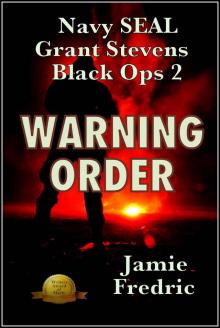 Warning Order
Warning Order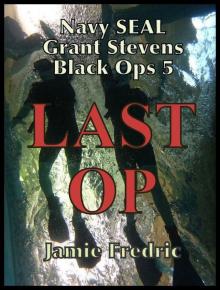 Last Op
Last Op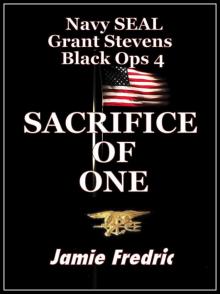 Sacrifice of One
Sacrifice of One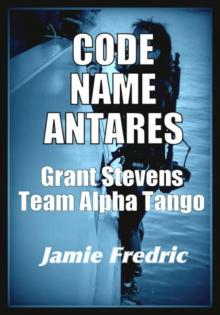 Code Name Antares
Code Name Antares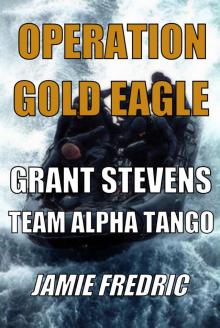 Operation Gold Eagle
Operation Gold Eagle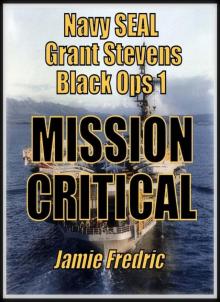 Mission Critical
Mission Critical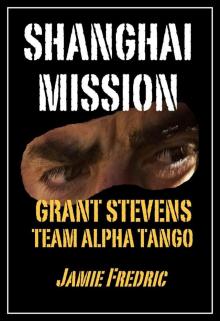 Shanghai Mission
Shanghai Mission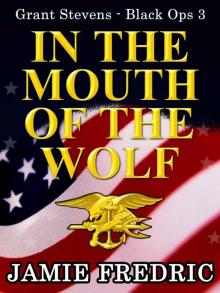 In the Mouth of the Wolf
In the Mouth of the Wolf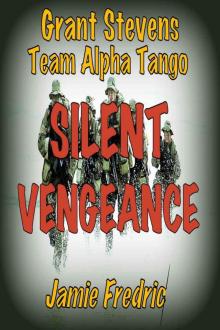 Silent Vengeance
Silent Vengeance